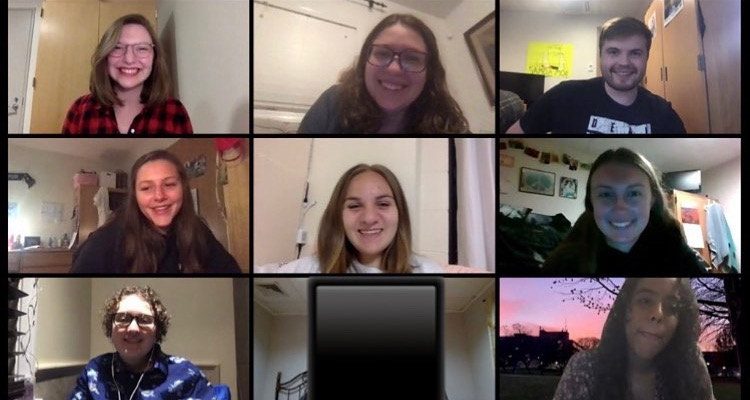COVID-19 forced Fairfield University to make some difficult decisions regarding how to proceed with classes. New requirements by the University demand that some classes go online or have a specific capacity for in-person classes. Some classes have even been held in outdoor tents, weather permitting. All of these new guidelines have forced some disciplines to change their curriculums and usual procedures.
It’s difficult enough as it is to have any humanities class on Zoom, but it’s even more difficult for the art history department. Art history requires hands-on learning and in-person experiences to look at art with one’s own eyes, not on a screen. Despite this, Michelle DiMarzo, Ph.D. has been trying her best to teach her classes well, and safely.
“This semester I’m teaching ‘AHST 1001: Exploring Art History: Technology and Art.’ We’re hybrid and using a rotation of Quip, in-person meetings in small groups and Zoom meetings with the entire class,” she said.
Of course, DiMarzo has used some unorthodox methods to teach her students in the midst of COVID-19.
“We’ve been looking at Leonardo da Vinci’s ‘Mona Lisa,’ so yesterday I had students in the classroom looking at artists’ materials from our teaching collection that were in use during that time… In a pre-COVID-19 world, the classroom time would have been more literally ‘hands-on’: I would have passed around the samples, let students run their hands over a bare wooden panel versus the smooth, gessoed surface of a primed one and feel the weave of canvas under their fingers, instead of just holding them up,” DiMarzo said. “Students who were not able to be in class at all, who I met with separately on Zoom, were at an even further removal – I was holding the sample containers up to the laptop camera, trying to make sure they could see the difference between a plain “red earth” pigment and the brilliant red of a lake made from crushed-up cochineal insects. Not ideal, perhaps, but still making it work!”
Fairfield’s nursing program is home to some of the largest class and lecture sizes on campus, also requiring students to take part in hands-on lab assignments and clinicals in hospitals, both in-person.
Alison Kris, Ph.D. is teaching pathophysiology and pharmacology this semester, with two sections of 40 students each. She has had to significantly alter her teaching style to accommodate her large class sizes to Fairfield’s new room occupancy guidelines.
“I have broken each section into two groups and have been meeting with each group of students in-person once per week, and am posting online lectures to cover most of the content,” she said.
However, the nursing program is not immune to the reach of COVID-19.
“Unfortunately, our class has been hard hit by COVID-19, and increasing numbers of students have shifted exclusively to online learning as the result of testing positive, or being placed into quarantine,” Kris said. “I have been spending a lot of time thinking through how to manage the increasing numbers of affected students.”
Despite the increasing number of COVID-19 cases on campus, Meredith Kazer Ph.D., dean and professor of nursing, is doing all she can to ensure that nursing students get the education they need.
“The caring commitment and strong reputation of our faculty and students has fostered the ability to continue clinical experiences and forge new opportunities,” she said.
Kazer still plans to continue with learning as normally as possible.
“Gowned, gloved and masked, students and faculty have continued to care for simulated patients in lab settings, and real patients in hospitals and community agencies throughout Connecticut,” she said.
Theatre has, perhaps, the most dramatic change in curriculum and procedure this semester. Since the entire point of theatre is in-person, live performance, Theatre Fairfield had to significantly change their programming for the Fall 2020 semester, affecting both theatre classes and scheduled live productions.
Martha LoMonaco, Ph.D., a professor in the theatre department, had to change some of Theatre Fairfield’s programming for this fall. “Theatre Fairfield will be totally virtual for the fall semester,” she said. “Both of our Fall shows, ‘Love and Imagination’ and ‘Director’s Cut,’ will be conducted completely online, from auditions through performances.”
Initially, Theatre Fairfield planned to perform the play “DollHouse,” by Theresa Rebeck, but was forced to change to “Love and Imagination,” a series of short vignette plays, since all of the performances are scheduled to be on Zoom.
“Our first priority is the safety of all personnel–we want everyone to stay healthy and to never, ever to be put at risk,” LoMonaco said.
It seems that professors of all disciplines are trying their absolute best to maintain a good quality of learning for their students, even in this unprecedented time.


Leave a Reply